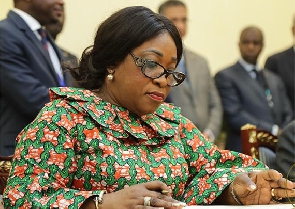Foreign Minister-designate, Shirley Ayorkor Botchway says for the Economic Community of West African States (ECOWAS) to achieve its Vision 2050 agenda, the role of traditional and religious leaders cannot be underestimated.
At a consultative meeting to discuss ECOWAS Vision 2050, the minister said inputs from the leaders will be needed for a peaceful, prosperous and a peaceful region considering the revered role of traditional and religious leaders.
The meeting to present the ECOWAS Vision 2050 to the traditional and religious authorities took place at the palace of the Okyehene, Amoatia Ofori Panin, in Kyebi where the minister noted that ECOWAS Vision 2020 was adopted in June, 2007 by the Authority of Heads of State and Government of ECOWAS as the development blueprint for the transformation of West Africa into a borderless, peaceful and prosperous region by 2020.
The ECOWAS Vision 2020 came to an end in December 2020, necessitating the development of a Roadmap for the preparation of the Post 2020 Vision – now referred to as ECOWAS Vision 2050. The processes to fashion out the ECOWAS Vision 2050 commenced in January 2019; and this meeting is part of that ongoing process.
She said “you are aware that hitherto ECOWAS had been seen, and rightly so, as the Community which has lost touch with the citizenry. ECOWAS was basically viewed as a Community belonging to bureaucrats and politicians without the involvement of the grassroots.
“I am happy that collectively we are taking commendable steps to correct this wrong impression about ECOWAS. I am of the firm conviction that this meeting and subsequent engagements with other stakeholders will lead to outcomes which will contribute to the formulation of attainable and relevant objectives for the region” she noted. Host of the meeting, the Okyehene, Amoatia Ofori Panin acknowledged the enormous resources the sub region is blessed with but lamented why its citizens are the poorer for it.
“The Economic Community of West African States hosts the largest economic and political union in Africa and has the responsibility to set an example for the rest of the continent and the whole of the developing world.
“The Sub Region abounds with enormous resources: minerals, forestry, freshwater, marine, a diversified climate that supports all kinds of plants and livestock production, cash-crop agriculture potential of all types including ecotourism.
“However, despite these enormous opportunities much attention has not been paid in harnessing the enormous resources of the Sub Region with the consequence that the people of the Sub Region are thrown into the abyss of mass poverty, hopelessness and degradation.
“These vast opportunities are hampered by persistent gaps in education, health, and skills, but most importantly bad governance which has left the Sub Region reaching a minimal 40% of its estimated potentials,” he said
General News of Saturday, 27 February 2021
Source: 3news.com













